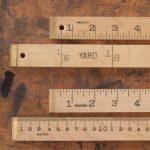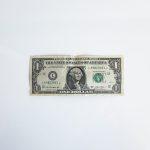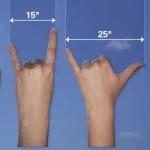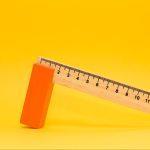How To Measure 1 Meter Without A Ruler?
Understanding how distance and time function is essential to relating to others in society, even though they can be challenging. This is because talks frequently call for you to estimate distance and time accurately, so knowing how they function will be quite helpful (skip straight to how to measure 1 meter without a ruler size chart).
The gap between two objects or points is measured in terms of distance, which is often quantitative and sometimes qualitative. This knowledge can be required for practical use or a complete grasp of physics. The meter is the base unit of measure (metric unit) for length in the International System of Units (SI). For ease of understanding, however, smaller lengths are measured in centimeters (meter x 10-2) while larger lengths are measured in kilometers (meter x 103).
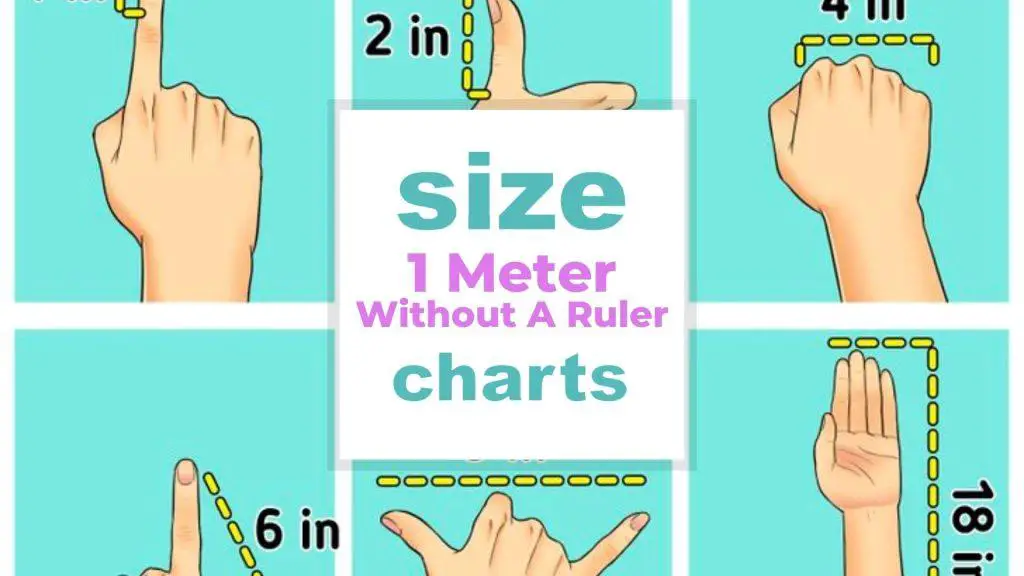
Other than meters, lengths and distances can be measured in feet, inches, yards, and miles. 1 foot is equivalent to 0.3 meters, one inch is equivalent to 0.0254 meters, one yard is equivalent to 0.914-meter and one mile is equivalent to 1609.3 meters.
This article focuses on the equivalence of a meter. It will serve as a guide to understanding how to measure a meter when you do not have a ruler handy. The article will also contain answers to some of the internet’s most frequently asked questions about a meter.
Jump right into the Frequently Asked Questions
Related: Reading A Ruler: Everything You Need to Know, Printable Ruler In Cm: Make it Yourself
Measure 1 Meter Without A Ruler Table of Contents
- Metric unit Conversion Chart for a Meter
- How do you measure a Meter without tape?
- Frequently Asked Questions
Metric Unit Conversion Chart for a Meter
Related: How To Measure A Foot Without A Ruler
| Unit | 1 meter Equivalence |
| Nanometers | 1, 000, 000, 000 (1 x 109) |
| Microns | 1, 000, 000 (1 X 106) |
| Millimeters | 1, 000 |
| Centimeters | 100 |
| Kilometers | 0.001 |
| Inches | 39.37 |
| Feet | 3.28 |
| Yard (meters to yards) | 1.09 |
| Miles | 0.000621 (6.21 x 10-4) |
| Nautical Miles | 0.00054 (5.4 x 10 -4) |
How do you measure a Meter without tape?
Related: Printable Measuring Tape: Do It Yourself
There are several ways to estimate a meter without actually having to bring out a metric ruler (variable scale ruler/ imperial scale ruler) or a measuring tape. One common measure of a meter is a walking step. Although every person’s steps will be different in length, a fully-grown adult covers about 2.5 to 3 feet in length; since 1 meter is equivalent to 3.28 feet, measuring a full step plus a quarter step will give an indication of what a meter should look like.
Another common way to estimate a meter is by using your forearm. Although the length of a person’s forearm depends on several factors including age and height, the average adult forearm (height: 69 inches tall) measures about 16 to 18 inches long. Since a meter is equivalent to 39.37 inches, a meter will be about 2.5 times the length of an adult forearm.
Also, you can estimate a meter using your credit cards (bank cards or business cards). Most credit cards are about 3.4 inches long, so 12 credit cards will be equivalent to a meter. In addition, dollar bills are another good way of measuring a meter. A USA dollar bill (paper money) is about 6.14 inches long and since a meter is equivalent to 39.37 inches, a meter will be equivalent to about 7 and a half dollar bills.
Finally, a full-sized guitar gives an indication of how long a meter is. Although guitars come in different sizes, a common full-sized guitar measures about 38 inches in length; this is about an inch short of a meter.
Learn more about how to measure 1 meter without a ruler (video)
Frequently Asked Questions
Is a tape measure 1 meter?
No, common tape measures measure longer than 1 meter. A tape measure (also a continuous ruler) is a common household instrument used for taking body/cloth measurements or other types of measurements. It is also used to quantify the size of an object or the distance between two objects. Common types are marked along their edge inches and fractional inch on one side and lines mark millimeters or the largest mark centimeters on the other side.
The most common tape measures 12 feet, 25 feet, or 100 feet in length. The 12 feet tape measure is the handiest and thus the most commonly used by consumers. Since a meter measures about 3.28 feet, none of the tape measures is equivalent to a meter. Instead, one tape measure is equivalent to about 3.5 meters.
What is the same length of 1 meter?
Sometimes, visualizing the length of 1 meter can be challenging, but comparing it with everyday items can help with estimating how long a meter is.
A common equivalence of a meter is the width of a standard refrigerator. Although refrigerators, most times, vary in both height and width, picturing the width of a standard refrigerator can help to estimate what a meter looks like.
Another common equivalence to a meter is the width of door frames. To understand how long a meter is, you can picture the width of a standard single-door frame. Most single standard doors are built to be about 1 meter in width to allow for maneuverability.
In addition, a baseball bat is equivalent to a meter and likely one of the most accurate items to visualize a meter. Although, baseball bats are just a few inches short of being a meter, as they are often about 35 inches in length which is only about 4 inches short of a meter.
Is a meter exactly 3 feet?
No, a meter is almost 3 feet but not exactly equivalent to 3 feet. A meter is exactly equivalent to 3.28 feet, and although many people believe that a meter is the same as 3 feet, it is in fact 0.28 feet longer.
How do you measure 1m by hand?
You can estimate the length of a meter using just your hand. If you extend your arm and fingers, you will usually get about 39 inches which is almost equivalent to a meter. To be sure, you can first measure your arm to find out how close to a meter it is.
What is 1 meter on a ruler?
One meter on a ruler is equivalent to about 39.37 inches, 100 cm, and 1000 millimeters, depending on which unit is used on the ruler.
Conclusion
It is important to understand how estimates of lengths work. There are various units for lengths and distances, but the standard unit is the meter, the meter is equivalent to 39.37 inches, 3.28 feet, and 1.09 yards. The article above further provided an understanding of estimating a meter by offering its equivalence with common items. The article also contained the meter conversion chart and answers to some of the internet’s most frequently asked questions about the meter.
Remember that a meter is equivalent to about 2.5 times the length of an adult forearm, about 7 and a half dollar bills, and the length of a common full-sized guitar. Also, one regular tape measure is equivalent to about 3.5 meters. A meter is equivalent to the width of a standard refrigerator, the width of standard, single-door frames, and the length of a baseball bat. It is important to note that nothing beats the accuracy of tape measures to confirm the actual length of an object.
Furthermore, a meter is exactly equivalent to 3.28 feet, 39.37 inches, 100 cm, and 1000 millimeters; If you extend your arm and fingers, you will usually get about 39 inches which is almost equivalent to a meter.
We love to hear from you so please leave a message for us in the section below and we will reply to you as soon as we can.
Picture in this post is by eskay lim on Unsplash
Related to Measure 1 Meter Without A Ruler
- Barbie Doll Size : What are different sizes of Barbie ?
- Blanket sizes chart : blanket sizes and dimensions in inches & cm
- Tablecloth size chart – What are standard tablecloth sizes ?
- How Many Meters Are In A Yard?
- How Many Centimeters are 8 Inches?
- Knife Sizes and Different Types
- 4 Inches is How Many Centimeters?
- Light Bulb Base Sizes : What size light bulb base do I need?
- Tesalate Towel Size Guide
- Light bulb Size : What are the different and standard bulb sizes?
- Duvet Sizes: What is a Standard-Size Duvet?
- Single Car Garage Size and Dimensions
- How High Is A Story?
- How Much Does 1 Cup Of Rice Weigh?
- Cast Iron Skillet Sizes: What Size Do I Need?
- Dollar Bills Size Chart
- Pizza Sizes: Which One to Order?
- How To Measure A Foot Without A Ruler
- Wine Glass Size Chart
- Tiny Houses Size Charts
- How Many Inches Are In 20 Centimeters?
- How To Measure 1 Meter Without A Ruler?
- Nightstand Size and Dimensions for Bedroom




